CALLING OUT OUR LEADERS WHO ARE MORAL PRETENDERS
It takes political will to prevent and take the steps needed to stop genocide.
Since 2003, the world has had chance after chance to act regarding the genocide on the Darfuri families who now live in refugee camps, if they haven't been killed.
So leaders of the world, you just don't care about genocide.
CARING IS HUMAN
SO WHY DO WE GO WRONG AS A RACE?
When we can watch people from around the planet mourn Michael Jackson's death, Darfuri people who have lost their lives get no such attention.
What does it say about us that we can turn away from those in need, when we have the ability to help?
What does it say about us that we are like moths to a flame to stories of celebrity, but stories of humanity and inhumanity simply are ignored?
When "it" isn't happening to us, few care.
~~~~~~~~~~~~~~~~~~~~~~~~~~
I am still playing catch up with the posts from the iACT team visiting the Darfuris
If you want to see all the days posted, use this link
http://www.stopgenocidenow.org/iact/iact8
As of today, each day has a post for June 15 through June 25, 2009 at the above link.
Day 11 Action: Hope Lies in the Babies
During this i-ACT we have called the White House, Special Envoy Gration and sent text messages to Secretary of State Clinton. Today is the time to bombard the White House email box. Cut the message below and Paste it to the White House Comment Box:
With your election, Darfur refugees had as much hope as I that you would work with “unstinting resolve” to bring peace and justice to Darfur and all of Sudan. Mothers and fathers have named their new born sons after you, and students have renamed their schools Obama. They still believe that if the United States becomes a leader in the movement to bring justice and peace, then the international community will follow. Will you stand with the people of Darfur?
Please finish the Sudan Policy Review, support the arrest warrant for al-Bashir, and work multilaterally to bring peace to all of Sudan.
Salaam,
Your Name
Read Speaker Pelosi’s World Refugee Day Statement.
Missed our live feed from Chad for World Refugee Day? View segments of the day here.
Write to President Obama
http://www.whitehouse.gov/contact/
You can also write to the President at:
The White House
1600 Pennsylvania Avenue NW
Washington, DC 20500
President Obama can be called:
202-456-1111
or
1-800-GENOCIDE
The White House comment line is available
9:00 a.m. - 5:00 p.m. weekdays
~~~~~~~~~~~~~~~~~~~~~~~~~~~~~~~
Find USA elected politicians contact information at this link:
www.usa.gov/Contact/Elected.shtml
~~~~~~~~~~~~~~~~~~~~~~~~~~~~~~~
www.stopgenocidenow.org
www.enoughproject.org
www.savedarfur.org
www.eyesondarfur.org
whilewewaitsudan.blogspot.com
>:>:>:>:>:>:>:>:>:>:>:>:>:>:>:>:>:>:>:>:
..........................................................
iACT 8, Day 8 June 22, 2009
From Darfuri refugee camp
Uploaded by stopgenocidenow
Day 8 Action: Be Heard
Let us be heard by our leader, President Barack Obama. Everyone we meet has faith that he will do the right thing. We even met one man who named is newborn son, Obama because President Obama believes in peace, justice and democracy. Unfortunately, President Obama is like most other politicians in that his actions are motivated by re-election. He needs to hear from you.
This week, between 9am-5pm EST, call the White House 202-456-1111 and tell President Obama to bring justice and peace to Darfur.
If you get a busy signal. Please don’t give up. Call back, usually it takes a few quick dials within a few minutes to reach one of the White House Operators.
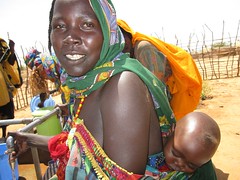 We have all been quite active here in Goz Beida, Chad the last few days. Anyone following the website is well aware of the World Refugee Day activities, and if you saw any of the videos, then you might have an idea of the extensive preparations that went into them as well. This has been one of the most satisfying experiences of my life, and we still have a few days left. The thing that has been on my mind a lot is the intense humanitarian effort on the ground in Chad. The people that work with the UNHCR are simply amazing. Before I got here, I had no idea what UNHCR stood for, now I am a beneficiary of their generosity and knowledge. I can’t imagine working here everyday in the heat, dust, and lack of Starbucks. It’s a thankless job. In this arena, the world is focused on the genocide and how horrible it all is on one side, and on the other side, the UNHCR fields all the refugee’s complaints. In reality, the UNHCR and all the satellite NGO’s here are providing the necessary amenities and infrastructure for people in the camps to survive. Without them, the numbers of deceased would be dramatically higher. I keep thinking to myself, how in the world could anyone be down here for more than two weeks, let alone a year to year and half, which is the length of most contracts. I have developed a sense of guilt about coming in for such a short time, while the refugees and the humanitarians here grind it out…day after day…in conditions that are extremely difficult, if not impossible. This leads me to think about some of the comments and correspondences I’ve had from friends and family over the last week.
We have all been quite active here in Goz Beida, Chad the last few days. Anyone following the website is well aware of the World Refugee Day activities, and if you saw any of the videos, then you might have an idea of the extensive preparations that went into them as well. This has been one of the most satisfying experiences of my life, and we still have a few days left. The thing that has been on my mind a lot is the intense humanitarian effort on the ground in Chad. The people that work with the UNHCR are simply amazing. Before I got here, I had no idea what UNHCR stood for, now I am a beneficiary of their generosity and knowledge. I can’t imagine working here everyday in the heat, dust, and lack of Starbucks. It’s a thankless job. In this arena, the world is focused on the genocide and how horrible it all is on one side, and on the other side, the UNHCR fields all the refugee’s complaints. In reality, the UNHCR and all the satellite NGO’s here are providing the necessary amenities and infrastructure for people in the camps to survive. Without them, the numbers of deceased would be dramatically higher. I keep thinking to myself, how in the world could anyone be down here for more than two weeks, let alone a year to year and half, which is the length of most contracts. I have developed a sense of guilt about coming in for such a short time, while the refugees and the humanitarians here grind it out…day after day…in conditions that are extremely difficult, if not impossible. This leads me to think about some of the comments and correspondences I’ve had from friends and family over the last week.
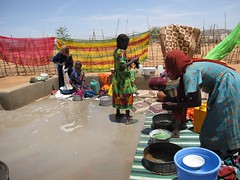 Many of my friends have written, sometimes in the same sentence, that they are very impressed with what I’m doing, while at the same time feeling it’s a reminder that they’re stuck in an office doing the same old job over and over, which isn’t that fulfilling. (I’m paraphrasing) I suppose it’s a positive thing to have these emotions of feeling stagnant arise, and begin to ask the questions of how to move beyond our own repetitive situation. If I’m the catalyst to that, then so be it. If the instinct is to move, then it’s probably the thing to do. The level of action will most likely be different for everyone as well. I don’t encourage everyone to quit their jobs and hit all the front lines of every conflict around the world, but you could do a humanitarian vacation to start. However, I think being a humanitarian starts on the most basic level, respecting others. That is probably the hardest step of them all. At least for me it is.
Many of my friends have written, sometimes in the same sentence, that they are very impressed with what I’m doing, while at the same time feeling it’s a reminder that they’re stuck in an office doing the same old job over and over, which isn’t that fulfilling. (I’m paraphrasing) I suppose it’s a positive thing to have these emotions of feeling stagnant arise, and begin to ask the questions of how to move beyond our own repetitive situation. If I’m the catalyst to that, then so be it. If the instinct is to move, then it’s probably the thing to do. The level of action will most likely be different for everyone as well. I don’t encourage everyone to quit their jobs and hit all the front lines of every conflict around the world, but you could do a humanitarian vacation to start. However, I think being a humanitarian starts on the most basic level, respecting others. That is probably the hardest step of them all. At least for me it is.
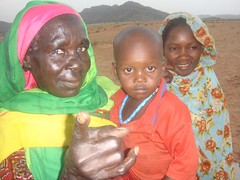 Even though I’m here in support of refugees, I almost lost my cool with a group of kids the other day in the camps. I needed them to back away from the person I was filming and keep silent. But instead, they kept on crowding me, grabbing at my “manpurse” and my arms, while repeating everything I said. I would make aggressive gestures with my arms to step away and sternly yell “back, back,” and immediately a chorus of ten kids would repeat “back back” and keep advancing. Their laughter made me feel mocked and I wanted to smack those little f#@*!, but then I remembered they didn’t speak my language, (nor I their’s) and I had just spent the last few days encouraging them to repeat all my words and gestures, so in a sense, I created a monster. Not to mention, they had just survived genocide, so I cut them some slack. But I was still frustrated! Point is, if I’m going to get upset with those that might deserve more patience than anyone, it’s probable that every human being on earth is going to get under my skin at some point. So the challenge is there for me personally. It’s a hell of a lot easier to be a humanitarian when you’re surrounded by them everyday, but how do I become a humanitarian in everyday life? That will remain to be seen. But if we all crack that one, it could be contagious.
Even though I’m here in support of refugees, I almost lost my cool with a group of kids the other day in the camps. I needed them to back away from the person I was filming and keep silent. But instead, they kept on crowding me, grabbing at my “manpurse” and my arms, while repeating everything I said. I would make aggressive gestures with my arms to step away and sternly yell “back, back,” and immediately a chorus of ten kids would repeat “back back” and keep advancing. Their laughter made me feel mocked and I wanted to smack those little f#@*!, but then I remembered they didn’t speak my language, (nor I their’s) and I had just spent the last few days encouraging them to repeat all my words and gestures, so in a sense, I created a monster. Not to mention, they had just survived genocide, so I cut them some slack. But I was still frustrated! Point is, if I’m going to get upset with those that might deserve more patience than anyone, it’s probable that every human being on earth is going to get under my skin at some point. So the challenge is there for me personally. It’s a hell of a lot easier to be a humanitarian when you’re surrounded by them everyday, but how do I become a humanitarian in everyday life? That will remain to be seen. But if we all crack that one, it could be contagious.
 We’re sitting in a hut in the middle of camp with a group of men, talking war, politics, and pain. It is hot, and there are flies everywhere, the kind of flies that think nothing of swatting. It is only the men and us, no children and no laughing. One of them, soft-spoken and wearing their traditional head-scarf that protects them from heat and sand in the desert, starts listing all the attempts at negotiations between rebels and Khartoum government and all the signed agreements–all failed and unkept. Do they, Khartoum, really want to find a peaceful solution? “No, they want all blacks out of Darfur.”
We’re sitting in a hut in the middle of camp with a group of men, talking war, politics, and pain. It is hot, and there are flies everywhere, the kind of flies that think nothing of swatting. It is only the men and us, no children and no laughing. One of them, soft-spoken and wearing their traditional head-scarf that protects them from heat and sand in the desert, starts listing all the attempts at negotiations between rebels and Khartoum government and all the signed agreements–all failed and unkept. Do they, Khartoum, really want to find a peaceful solution? “No, they want all blacks out of Darfur.”
Another even more serious looking man and even more soft-spoken, looks at me straight in the eyes and keeps that eye connection the whole time he speaks–no blinking. We are only about seven feet away, and I feel uncomfortable–I am not sure why, but it must be that, with the look, he is telling me “Now you know. You are responsible.” He is dressed in safari green pants and long-sleeve shirt–very clean and neat. “Justice. Without justice there is no peace. If you start with justice, peace follows. Then we can go home.”
We leave the hut and follow the serious man in green, walking all the way to the other side of the camp. He has us sit in a much cooler hut than the one before, and there are no flies. His wife joins us and is carrying a beautiful 20 days old boy. “His name is Obama.”
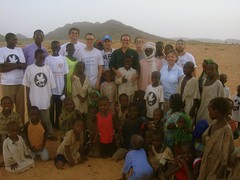 Today was our last day in Camp Djabal. I already miss them all and it has only been hours. I don’t know when I will be able to come back to Camp Djabal. I fear it will be longer than I want, and that the conditions of the camp will be worse. It makes me sad to think that some may not even make it until our team returns.
Today was our last day in Camp Djabal. I already miss them all and it has only been hours. I don’t know when I will be able to come back to Camp Djabal. I fear it will be longer than I want, and that the conditions of the camp will be worse. It makes me sad to think that some may not even make it until our team returns.
In the camp this morning, the sun beat down on the sand, and our backs as we weaved through the straw made alleyways searching for Adef and Achta. We asked one tall man, who smiled, pointed and began to walk beside us.
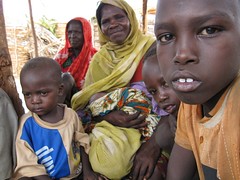 We soon found our family. I feel very close to Adef and Achta. For about an hour we exchanged with gestures before a translator came. Without words, Achta knew what I was trying to tell the children and she helped direct them. I distributed pens and paper for the children, and a book for their family. Abdelmouni is becoming a little man, still serious, but when he laughs it is the loud giggle of his sister and brothers. I feel so close to them, as if they are part of my own family. In many ways, they are.
We soon found our family. I feel very close to Adef and Achta. For about an hour we exchanged with gestures before a translator came. Without words, Achta knew what I was trying to tell the children and she helped direct them. I distributed pens and paper for the children, and a book for their family. Abdelmouni is becoming a little man, still serious, but when he laughs it is the loud giggle of his sister and brothers. I feel so close to them, as if they are part of my own family. In many ways, they are.
They don’t ask for much. Many people I know would be asking for so much if they were in a situation that the refugees, or even IDPs from Chad, were in. I think because we have grown up in such a rich country there is a sense of entitlement to having things, to having everything. Not so much here. What they want is education, justice, and peace. Justice so that Peace will come and Education so they can help lead their country.
 These are simple concepts that will require effort on the part of the international community. Skilled mediators, Financial Support. Disarmament. Arrest warrants acted on. Educational support through trainings, supplies, and infrastructure. These are things we in America take for granted most of the time. These are things that will help ensure that little Abdelmouni, Guisma, Bashir and Beshar grow up having some chance at leading fulfilling lives. The kind of life we expect to be handed to us.
These are simple concepts that will require effort on the part of the international community. Skilled mediators, Financial Support. Disarmament. Arrest warrants acted on. Educational support through trainings, supplies, and infrastructure. These are things we in America take for granted most of the time. These are things that will help ensure that little Abdelmouni, Guisma, Bashir and Beshar grow up having some chance at leading fulfilling lives. The kind of life we expect to be handed to us.
Maybe I am being to harsh on the country I grew up in. I may be acting on pure emotional response to the serious eyes of a three year old and a laugh of a young girl that used to roar and now rarely giggles. And I know that there are people throughout the world who are suffering, like those who have been injured or killed fighting for democracy in Iran. I know that Darfur and Chad are not the only places where people are seeking peace, justice, education and participation in the leadership of their people.
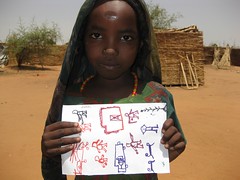 I just know personally that if I don’t work harder to bring peace and justice to Darfur and all of Sudan that my friends here will not go home. They will not have the opportunity to live fulfilling lives. They will not have choices. They will slowly begin to lose their culture as more generations grow up in camps outside of their homeland. Their entire world has already changed, and they adjusted as much as we can ask someone to adjust. In the end, they want to go home.
I just know personally that if I don’t work harder to bring peace and justice to Darfur and all of Sudan that my friends here will not go home. They will not have the opportunity to live fulfilling lives. They will not have choices. They will slowly begin to lose their culture as more generations grow up in camps outside of their homeland. Their entire world has already changed, and they adjusted as much as we can ask someone to adjust. In the end, they want to go home.
Please be part of allowing peace, justice, education, and CHOICE back into their lives.
paz, ktj
Pictures of iACT 8, Day 8 June 22, 2009 while with the Darfuris:
http://www.flickr.com/photos/stopgenocidenow/3648441478/
~~~~~~~~~~~~~~~~~~~~~~~~~~~~~~~~~~~
Below is news from Mohamed Suleiman, a Darfuri, who presently lives in the USA. He has relatives still living in Darfur, being affected by the genocidal acts of the government of Sudan.
Ghazi Salahuddin with audacity
Ghazi Salahuddin has a lot to show how his NCP has accomplished in bringing peace to Darfur: on papers! Hundreds of pages signed by NCP in 2006, he said , where all problems of Darfur were addressed.
Ghazi now advises the U.S. Administration to exert maximum preasure on Darfur rebels and the countries "support" them to sign more papers.
Ghazi got a slick PR advice: Take advantage of the American Free Speach ( NCP forbids all kinds of freedom in Sudan), and take your case directly to the American paper, talk about PEACE IN DARFUR.
Read what Ghazi Salahddin wrote in Washington Times, about giving PEACE in DARFUR:
http://washingtontimes.com/news/2009/jun/23/give-peace-a-chance/print/
Why Gration is Dead Wrong on Darfur
There is nothing called " Remnants of Genocide" when it comes to dealing with the crime of Genocide.
Gration's words help only one party: Perpetrators of the Genocide crime i.e. Khartoum Government.
As defined by U.N. Convention on prevention and punishment of crime of Genocide, the destruction of the people of Darfur is going on NOW. That is GENOCIDE.
Please read:
http://www.hrweb.org/legal/genocide.html
~~~~~~~~~~~~~~~~~~~~~~~~~~~
Forwarded from US MA Senator Kerry’s office
United States Senate Committee on Foreign Relations
WASHINGTON, DC
FOR IMMEDIATE RELEASE
June 23, 2009
Contact: Whitney Smith, 202-224-4651
Kerry Urges North and South Sudan to Implement Comprehensive Peace Agreement
WASHINGTON, D.C. " In a keynote address at last night’s Forum for Supporters of the Comprehensive Peace Agreement (CPA) in Washington, D.C., Senate Foreign Relations Committee Chairman John Kerry (D-MA) called on both North and South Sudan to make the compromises and decisions necessary to make the peace accord a lasting reality and a foundation for peace in Darfur. The forum was hosted by President Obama’s Special Envoy to Sudan, General Scott Gration.
“We need to think of the CPA as a process, not an event,” said Kerry. “The signing of the Naivasha Accords marked the end of the war, but only the beginning of the peace. Our challenge going forward is to ensure that the CPA does not become one more piece of paper littering the bloody history of Sudan. The reality is, both sides need to want peace more than they want victory at any cost. That’s the only way to make the right decisions. You cannot expect to get everything you want, and also expect to have peace. You have to choose"and I urge you to choose peace.”
Chairman Kerry last traveled to Sudan in April. He met with leaders from both political parties to urge direct Sudanese engagement in the problems plaguing the country.
Full remarks as prepared are below:
I want to thank you for that kind introduction, and for journeying here tonight in support of the Comprehensive Peace Agreement. Many of you gathered here are architects of this landmark accord, which brought to a close a decades-long war that had claimed over 2 million lives.
I want to recognize General Scott Gration, who today serves as President Obama’s special envoy to Sudan.
General Sumbeiywo of Kenya, who served as chief mediator of the CPA, and the honorable Hilde Johnson of Norway, who also played a critical part in shepherding negotiations, also honor us with their presence tonight. I would also like to recognize the Foreign Ministers of Ethiopia and Kenya, and my colleagues, Senators Corker and Isakson.
There were many parties to the peace negotiations, but ultimately the two that mattered most were the combatants themselves. Since declaring independence on New Year’s Day, 1956, Sudan had known far more years of war than periods of peace. In 2005, the leaders of North and South broke that pattern and committed to a better future. Dr. Ghazi Salaheddin and Governor Malac Agar tonight head the delegations for the National Congress Party and the Sudan People’s Liberation Movement, respectively. I want to welcome them both.
So many of you here today are the fathers and mothers " and even a few midwives"of Sudan’s peace agreement. As any parent will tell you, your obligations just begin at birth. They do not end there, believe me. Right now, peace is still a work in progress. You could even say the agreement is entering its troubled adolescence" and needs help to grow safely into maturity.
This April, for the first time, I traveled to Sudan to assist in the efforts to restore humanitarian assistance, to meet with men and women living in the camps in Darfur, and to safeguard the promise of the CPA.
Too many see America’s efforts to achieve peace in Darfur and peace between the North and the South as an either-or proposition. The truth is, new peace agreements in Darfur depend on upholding the CPA. Our engagement on the North-South deal isn’t a distraction from Darfur"it is essential to what we hope to achieve there. All of Sudan should know peace. We need a comprehensive approach"a process that I know General Gration is deeply involved in.
In my meetings in Sudan, I urged political leaders from both parties to re-engage on the tough issues that lie before them. And I acknowledged that the United States, which had helped them achieve this breakthrough agreement, had been too absent from helping the parties to deliver on the promise of Naivasha. A central focus of my visit was to further efforts, supported by General Gration, to bring the North and South into direct meetings, together with the United States to strengthen implementation of the CPA.
Like General Gration, I pledged that America would renew our commitment to see the CPA through to its conclusion. By gathering the signatories to the 2005 Agreement here in Washington, General Gration has inaugurated a new phase in the implementation of the CPA and has signaled America’s commitment to remaining at the table and growing Sudan’s four-plus years of fragile peace into decades of a durable peace.
January 9, 2005 was a momentous day. But we need to think of the CPA as a process, not an event. The signing of the Naivasha Accords marked the end of the war, but only the beginning of the peace. And, by design, the agreement postponed many of the critical decisions that would transform a cessation of hostilities into a lasting peace. We knew we had to build up trust first.
Our challenge going forward"before you, before me, before all of us here"is to ensure that the CPA does not become one more piece of paper littering the bloody history of Sudan.
Nobody in this room needs a lecture on all of the unresolved issues. You know them all too well. Our time is short and the obstacles are formidable. It’s not hard to see the path toward an escalation and collision. We all know the dangers: competition for oil and land, escalating arms races, and an unwillingness to communicate or compromise.
The reality is, both sides need to want peace more than they want victory at any cost. That’s the only way to make the right decisions. You cannot expect to get everything you want, and also expect to have peace. You have to choose"and I urge you to choose peace.
Just as the path toward war is clear, so too are the steps you must take to prevent it. There is no great mystery here: North and South need to share the wealth derived from oil; demarcate and define your boundaries; hold successful elections; and settle your questions of citizenship. None of which will happen unless the parties show a steely sense of resolve that peace was hard-won, and now must be protected. Successful implementation also requires the international community to deliver on their promises for development assistance for these war-torn areas.
In 2002, another special envoy, Senator John Danforth, wrote to the President that “Both sides want the conflict resolved, but on their own terms...Both sides view progress as a zero sum game.”
Today, you have a peace agreement replete with any number of committees and instruments for negotiation, but progress on actual implementation has stalled out. I urge you to recognize that 2011 does not, in fact, have to equal a zero sum game. Progress toward the peaceful fulfillment of the CPA, including a free and fair referendum on the question of self-determination for the South, offers enormous benefits to both sides, whatever the outcome of that vote.
Now is the time for the parties to help create post-referendum arrangements for mutual cooperation. I urge you not to fix your gaze on 2011 alone, but to think beyond that onrushing horizon: let’s talk about what Sudan could look like in 2012. Or 2015. Whatever the outcome of the referendum, time will not stand still in 2011 and we must not be afraid to think beyond it.
To get there, it is important to stick to the remaining timetable. Time is already not on your side and delaying national elections only foreshortens the narrow window parties have to prepare for a peaceful referendum. Rising violence in the South is a matter of growing concern and underscores the need for a tangible peace dividend.
America is eager to support the process of resolution, and the commitment among those present today is considerable. I am especially pleased that we are joined by Liu Guijin China’s Special Envoy to Sudan, because China can play such an important role in this process.
If we want peace in the future, we must learn the lessons of the past. The CPA offers a roadmap for resolving the remaining North-South issues, as well as lessons for the crisis in Darfur.
The first lesson is that peace would not have been possible without engagement. Like Senator Danforth, General Gration has initially concentrated on critical life-saving issues, especially restoring the humanitarian capacity on which millions of lives depend. Efforts to rebuild that operation are still underway" and the return of critical services such as assistance for the victims of gender-based violence has not even begun. But, unquestionably, it is moving in the right direction. Darfur’s still unresolved genocide"whose causes and consequences remain unaddressed-- demands our commitment to greater humanitarian assistance but also to help seek a lasting peace settlement for the people of Darfur. This is also part of the path to a new U.S.-Sudanese relationship.
A second lesson is that there is no process unless the combatants themselves commit to it, and regional and other partners support them in peacemaking. Efforts are underway today in Doha to achieve a political settlement in Darfur and to reduce tensions between Chad and Sudan"but some of the seats at the table are still empty. It is time for the principal rebel leaders to leave their refuges in Paris and elsewhere and come to the table.
A third lesson the CPA underscores is the importance of civil society. Too often those voices were not heard during the drafting of the CPA. I hope that with Darfur, the efforts of Mo Ibrahim and others to bring these voices into the discussion, and particularly to ensure that women are heard, finally succeed. Women have borne some of the most brutal costs of war and must be part of the peace process.
Having gone to war myself, I know what it means that in peacetime, children bury their parents, but in wartime, parents bury their children. Sudan has known too many generations of parents forced to bury their children, and too many children who, until 2005, knew nothing but war.
Today there are young children across the North and South alike who are actually growing up knowing what peace is like. If we fail, they will become soldiers in tomorrow’s war"a war that is in your power to avert.
The leaders of Sudan"and all who care about Sudan"need to ask ourselves: What is at stake here? What future do we choose? You can either choose to do the hard work of implementing peace"or you can all too easily drift back into the nightmare of war.
If you get this right, it doesn’t matter how the referendum turns out. And frankly, if you get it wrong, it doesn’t matter either. Two million deaths in the last war have taught everyone in this room that hard lesson.
Peace is never a zero sum game. The well being of your children is never a zero sum game. The future of your peoples are not, and cannot be, a zero sum game. We can all have a better future"but we have to choose it, and we have to choose it together.
Tomeika Bowden
Deputy Press
Committee on Foreign Relations (Majority)
Phone: 202.224.3468
~~~~~~~~~~~~~~
Arabic newspaper in London says
Senator Kerry is leading normalization with Khartoum
London based Arabic newspaper Alsharque AlAwsatSaturday June 27
1- The newspaper said Ghazi Salahuddin (Albashir adviser) was speaking to the Arab Correspondents League in Washington D.C.
2- Ghazi Salahuddin was very pleased with what Senator John Kerry told him in Washington. Ghazi Salahuddin said Senator Kerry told him that he will work on lifting of sanctions against Sudan and lifting Sudan's name from the list of countries sponsoring terrorism.
3- Ghazi Salahuddin said he met with many high American Officials in the White House, the Pentagon, The Department of State and discussed topics of relations normalization and how to implement CPA , but Darfur was not subject of any discussion.
4- Ghazi Salahuddin critizied Dr. Susan Rice and said that she is the only voice that "stuck in the past" and the lonely voice in the Administration that is standing against Khartoum. Ghazi Salahuddin said Rice is the only one working against the wishes of President Obama and still calls what is happening in Darfur a genocide while The Special Envoy of the President and Senator Kerry are no more calling it that...
Here is the source ( it is in Arabic):
http://www.aawsat.com/details.asp?section=4&issueno=11169&article=525123&search=%DB%C7%D2%ED%20%D5%E1%C7%CD%20%C7%E1%CF%ED%E4&state=true
.......................................................................
WHO'S THE BOSS?
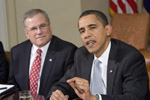
President Obama’s Special Envoy to Sudan created a public relations firestorm last week when he insisted that the situation in Darfur today reflected “remnants of genocide” rather than an ongoing genocide as had been suggested by President Obama and Ambassador Rice.
Gration’s initial comments triggered a spate of press stories about divisions within the administration on Sudan policy as well as a gleeful reaction from the Bashir regime which felt the special envoy was exonerating them from any involvement in genocide. After heated internal discussions that delayed the noon State Department briefing for over an hour, the State Department spokesman issued a clarification, saying, “I think there is no question that genocide has taken place in Darfur. We continue to characterize the circumstances in Darfur as genocide.”
One would have hoped that would have been the end of the story, but Gration was back at it again yesterday, publicly declaring in an interview with NPR’s Diane Rehm: “What I’m seeing personally on the ground is that those conditions [genocide] are not taking place right now.”
It is incredibly unfortunate that the administration, particularly the special envoy, can’t seem to answer this basic question consistently and without creating the damaging impression that administration policy on this issue is badly in disarray. The administration’s public back and forth on the genocide question only serves to embolden Khartoum, alienate the activist community, and distract the administration from leading an international coalition to address the myriad challenges in Sudan that loom from any number of key challenges that need to urgently be addressed.
So, in an effort to help the administration delineate its two options, we offer these audio clips. Here is Special Envoy Scott Gration yesterday, followed by President Obama at a recent press conference in Germany:
Who’s the boss?
~~~~~~~~~~~~~~~~~~~~~~~~~~~~
Brutally honest, blatantly true, and extremely specific, the U.N.’s Special Rapporteur on the situation of human rights in Sudan recently gave her report to the U.N.’s Human Rights Council. The report includes a section on Darfur, which is the only area of the world where a declared genocide is taking place.
Report of the Special Rapporteuron the situation of human rights in the Sudan, Ms. Sima Samar
from
UN HUMAN RIGHTS COUNCIL OF THE
11th session of the Human Rights Council: Reports
A/HRC/11/14
Advance unedited version
from page 10 (totalling 22 pages)
Here are some highlights of the report:
During the reporting period, ongoing fighting involving Government forces, signatories to the Darfur Peace Agreement (DPA), non-signatories to the DPA, and other armed groups, resulted in civilian casualties, destruction of civilian property, including homes and markets, loss of livelihood and mass displacement of affected communities. Violations of the right to life, torture, ill-treatment, arbitrary detention by all sides have also been reported.
From August 2008 to May 2009 there were 129 carjackings of United Nations and humanitarian vehicles, and the killings of three UNAMID peacekeepers. In a number of cases, Human Rights Officers continue to face difficulty in undertaking missions to various areas. On 31 December 2008, they were prevented from conducting monitoring work in Abu Suruj, West Darfur by SAF officials who demanded travel permits, and refused access to the area. A similar incident occurred in Abu Suruj on 15 April 2009. Obstruction of UNAMID personnel in the conduct of their mandated functions is inconsistent with the Status of Forces Agreement (SOFA) signed by the Government and UN in February 2008. In March, three international and two national staff of an international NGO were also briefly abducted.
Apart from human rights and humanitarian workers, the NISS continued to detain a number of IDPs and other civilians, often holding them incommunicado and without charge. Cases of ill-treatment and allegations of torture by the NISS continue to be reported across Darfur.
To view the full report on human rights situation in Sudan, please click here.
Labels: abuse, Alice Miller, Bashir, Camp, Darfur, Genocide, iACT, ilovemylife, Justice, Obama, Peace, Refugee, Sandra Hammel, Stolen Childhood, Sudan, Violent, We Are the World


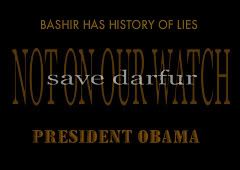

0 Comments:
Post a Comment
Subscribe to Post Comments [Atom]
<< Home